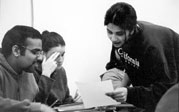



Back to the Roots?
by Jennifer Kho, Mike McPhate, Melis Senerdem
|
|
The 2000 census reports that there are 8,232 Pakistanis living in the
Bay Area. Most of them have left their country for good education, better
standards of living or well paying jobs. Their children, the second generation
of immigrants, however have other perceptions. Different from their parents,
they think there might be a future for them back home. Not only that,
but the education they have received here might serve a good purpose back
in Pakistan. Not every young Pakistani shares this view though.
Below you will find a series of interviews with university students from
the Bay Area. They discuss their future plans.
Kulsoom
Though still an undergraduate, Kulsoom Qamar is an expert on Pakistan.
This semester she is teaching her third student-led course on the politics
of the country. Qamar, who never lived in Pakistan but spent her summers
with family in Karachi, says many among her generation want to go back
to Pakistan to help improve the lot of ordinary Pakistanis.
"It's a very different outlook than my parents," she says,
refering to how her parents had to struggle to leave the Islamic country
and its struggling economy. "It's difficult to explain to them."
|
|
Aisha
Immediately after she graduates from UC Berkeley's Peace and Conflict
Studies program this December, Aisha Mohammed will fly to Pakistan, something
she would never have thought of a few years ago.
When Mohammed started her studies at UC Berkeley, she also began to learn about social movements and social justice issues in her South Asian and ethnic studies classes. She said that during those classes, she realized her knowledge about those topics was coming mostly from an American perspective.
It was only then, she said, that she began to feel curious about Pakistan.
Having spent half of her 21 years in Karachi and half in the US, Mohammed
is caught between two identities, each seemingly remote to the other.
She's been in the US since age 10 and considers herself American, even
though she says she is often denied a role in mainstream America culture.
But now she feels a duty to return to help fix a struggling education system in her ethnic homeland."Having had the privilege to be educated at Berkeley," she says, "I just feel like I should go back and use that education somehow."
|
|
Ahsia
Ahsia Khan says her grandfather is a hero in Kashmir. Her pale green eyes
light up when talking about how he fought for the torn Himalayan state
to join Pakistan. "My family sees that it was inappropriate that
Kashmir was split, or went to India, in the first place," she says.
Khan, a public health graduate student at UC Berkeley who came to the US at age three, admits that after five decades of fighting the possibility of independence resides only in the dreams of a handful of Kashmiris.

